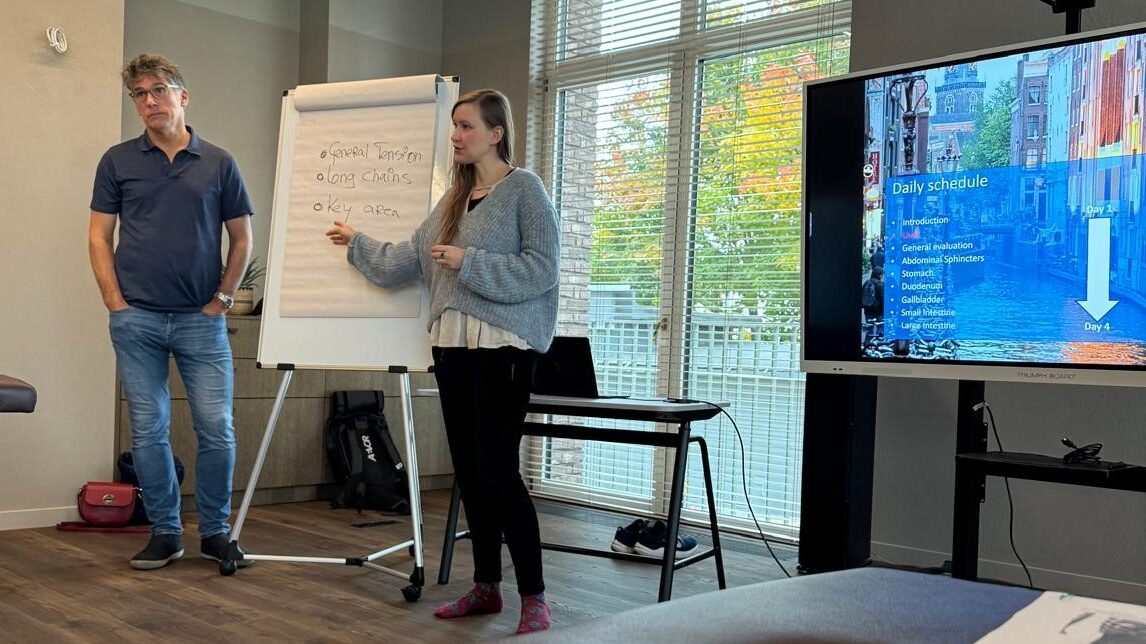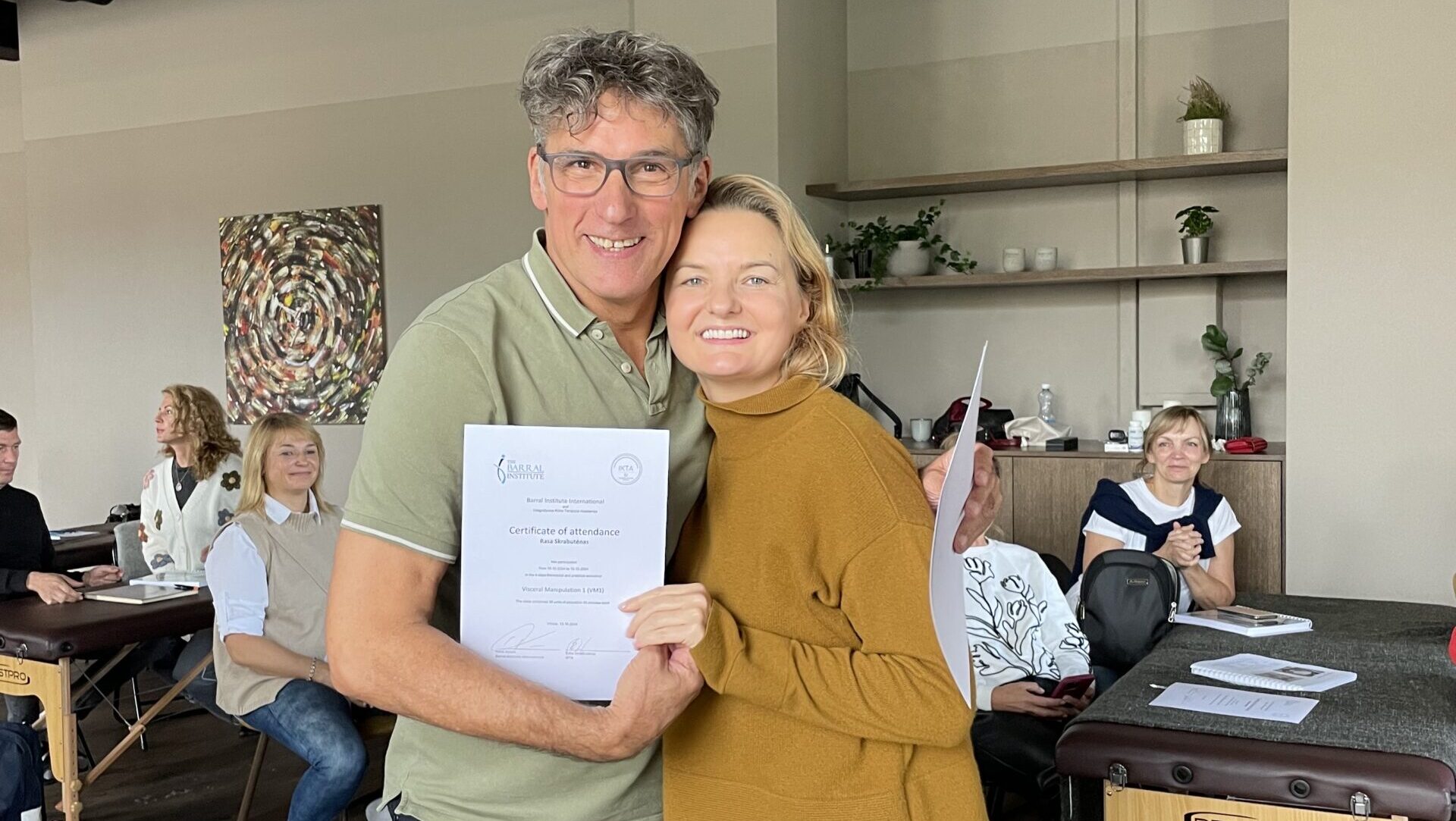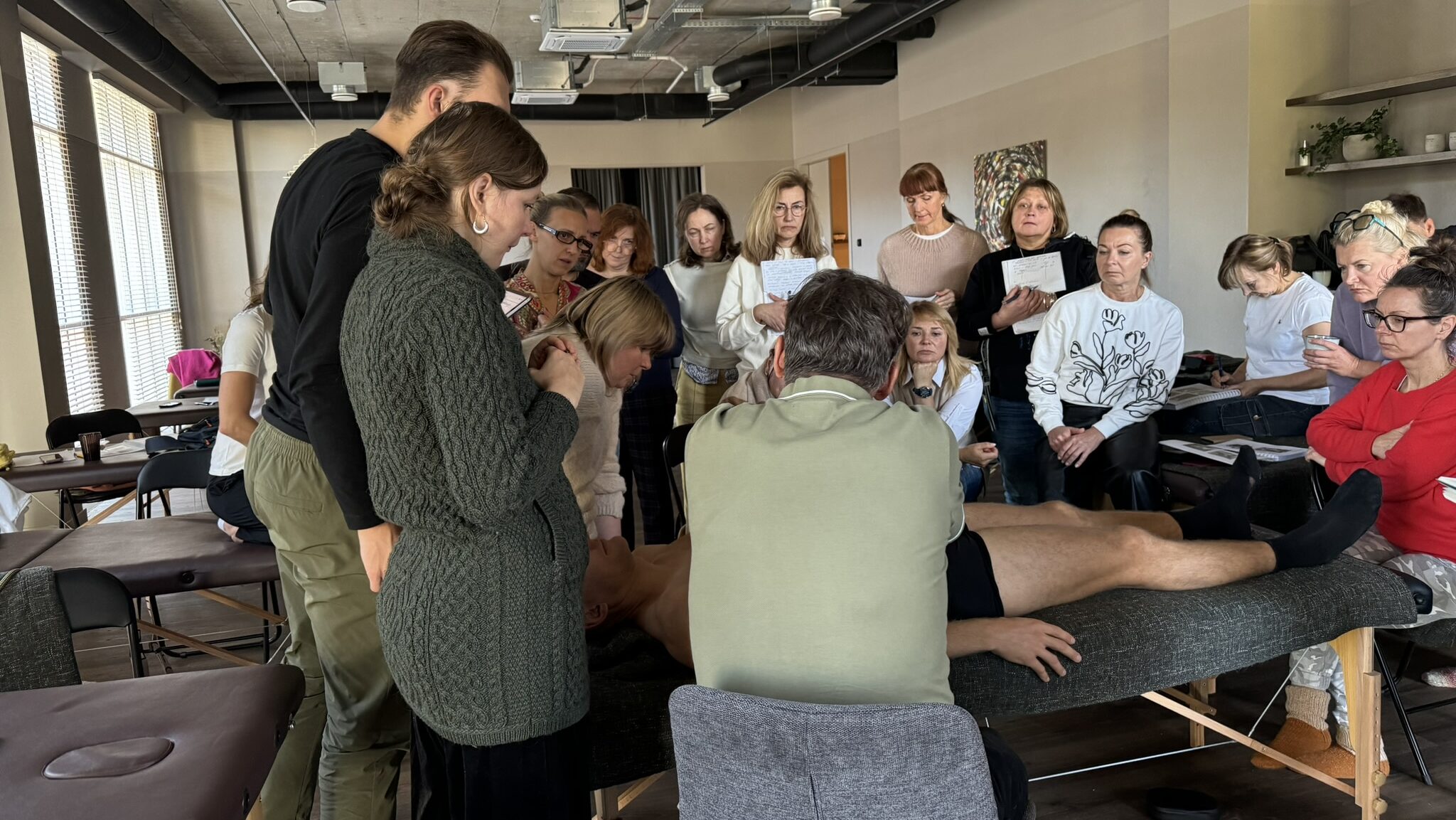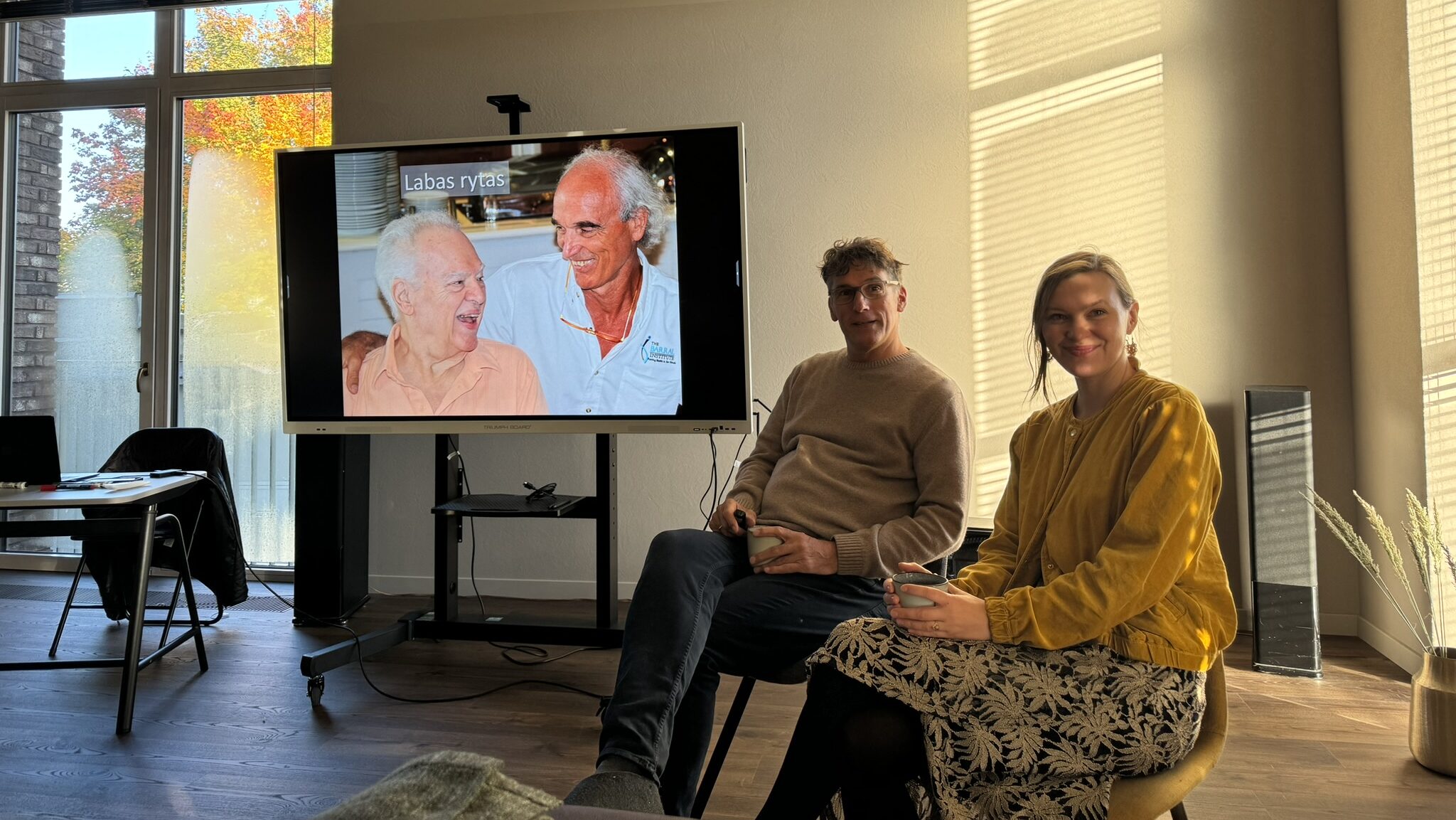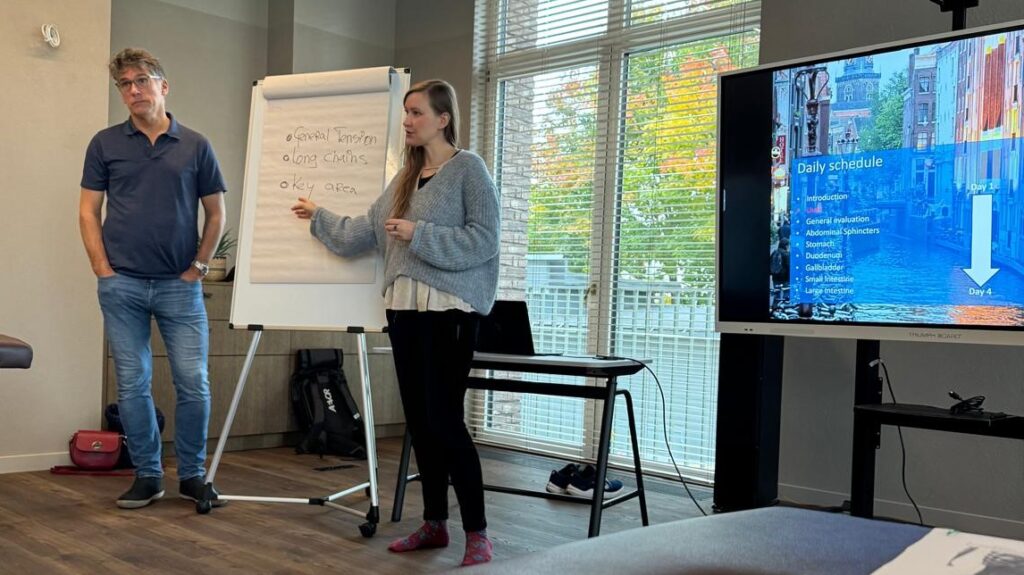
“The organs speak a silent language—visceral manipulation is how we learn to listen, to feel, and to restore their forgotten rhythms”
J.P. Barral
What is Visceral Manipulation?
Visceral Manipulation – a gentle, hands-on therapy created by French osteopath Jean-Pierre Barral. It aims to restore internal organs’ (viscera) mobility and harmony with surrounding tissues, based on the idea that impaired organ mobility can cause various disorders throughout the body.
Using extremely light touch, the therapist detects tissue tensions, adhesions or scars that hinder organ movement. By correcting these disorders, organ function improves, pain decreases and overall body balance is restored.
This therapy can help with back or pelvic pain, digestive and respiratory disorders, post-surgical scars, emotional stress or internal organ dysfunctions. Suitable for both adults and children.
“Only tissues know.”
– Jean-Pierre Barral
IKTA – Integrative Therapy Center Training Division – are the official and only representatives of Barral Institute in Lithuania. More information – video interview with Rene Assink.
Rene Assink Talks About Visceral Manipulation
Key Information at a Glance
ℹ️ What: Visceral Manipulation training according to Jean-Pierre Barral method – internationally recognized, scientifically based program. Courses are led by certified Barral Institute instructors. Graduates receive Barral Institute certificate and are included in international therapist registry IAHP.com.
ℹ️ Where: Training takes place at Integrative Therapy Center (IKTA), address Vytenio st. 4, Vilnius. Practical information about location, arrival, accommodation etc. – on our website, here.
ℹ️ When: Training is organized continuously in this sequence VM1 → VM2 → VM3 → VM4 ). If you miss a course in Lithuania, you can fill the gap in any country where Barral training is conducted. We also accept foreign students and assistants wanting to continue studies or complete missing courses in Vilnius.
ℹ️ How: Training is conducted in English with translation to Lithuanian – we ensure consistent translation in all level courses, so even those who don’t know English or know it insufficiently well can participate.
ℹ️ Price and discounts: Price depends on course (e.g., VM1, VM2 etc.) so please check the schedule. Discounts apply for early registration (code ANKSTI), returning participants(50%). Exact prices are in the schedule, and if you have questions or doubts, – be sure to contact us.
Students, Lecturers and Patients Speak
Ebba Boyesen
Daughter of biodynamic body psychotherapy creator Gerda Boyesen, method developer and co-creator, institute lecturer, therapist
Rita Guginė
Graduate of biodynamic body psychotherapy, practicing biodynamic biorelease massage specialist
Rasa Skrabutėnas
Graduate of biodynamic body psychotherapy, practicing body therapist, ITC co-founder
Studies
Visceral Manipulation training – modular system according to Barral Institute standards
Visceral Manipulation (VM) training follows modular principle, allowing gradual acquisition of theoretical knowledge and practical skills. Training structure is based on Barral Institute international standards – each module is independent, but together they form a consistent professional development path.
🔹 VM1 – Visceral Manipulation 1: Introduction to visceral therapy principles – learning palpation techniques, basic abdominal cavity anatomy and internal organ mobility assessment.
🔹 VM2 – Visceral Manipulation 2: Deepening into thoracic cavity organs (heart, lungs, diaphragm), structural connections and biomechanical disorders.
🔹 VM3 and VM4 – advanced modules: Further organs, more complex clinical situations, work with scar tissue, energetic and emotional body imprints.
🔹 Diploma and specialized courses: Topics like urogenital system, central nervous system, somatoemotional integration methods. Also opportunity to prepare for international certification.
Participants can choose one or several modules (if meeting required sequence), or complete entire Barral Institute certification path. Acquired skills are internationally recognized, so courses can be continued or supplemented in other countries following the same program.
How to Start?
ℹ️ To participate in Visceral Manipulation (VM) training program, you must start with VM1 course. The nearest VM1 course in Vilnius will take place May 7-10, 2026, and registration is already open:
Next VM1 in Vilnius:
ℹ️ If you want to start studies earlier, you can attend missing courses in another country, then join our course in Lithuania. For your convenience – information about all courses taking place in other countries worldwide. A great opportunity to combine professional development with short vacations!
Program
VM1: Abdomen
VM2: Abdomen Part Two
VM3: Pelvis
VM4: Thorax
Together!
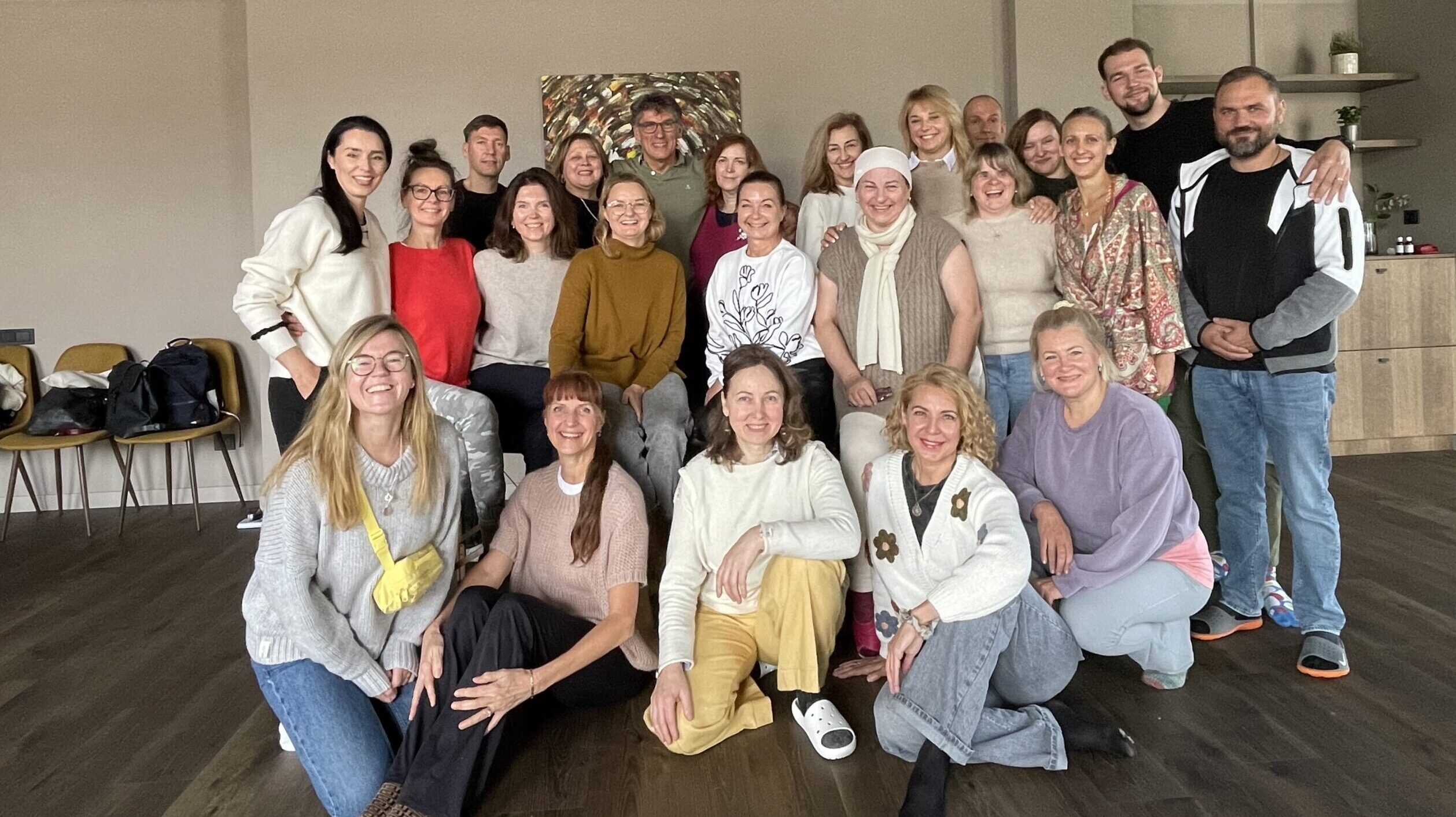
In the photo – first VM group at our center. We’re proud of our students who already successfully apply visceral manipulation working with patients! One inspiring example – family doctor, endobiogenic Jurgita Šukevičienė, combining endobiogenics with visceral manipulation.
Certification
🏅 VM Techniques Level Certification (CVTP)
This certification confirms your ability to apply basic Visceral Manipulation (VM) techniques according to Barral Institute methodology. To obtain it, you need:
🔹 Have valid license or qualification allowing to work with people (e.g., physiotherapist, massage therapist, doctor, nurse etc.).
🔹 Successfully complete these courses:
-
- VM1 – Abdominal Cavity 1
- LT1 – Listening Techniques 1
- VM2 – Abdominal Cavity 2
- VM3 – Pelvic Area
- VM4 – Thoracic Area
🔹 Complete 5 written case descriptions according to set format.
🔹 Pass home-based theoretical test (VM1-VM4 material).
🔹 Pass practical and oral exam with Barral Institute examiner (listening, mobilizations, organ testing, theoretical questions).
🎓 VM Certified Practitioner Level Certification (CVMP)
This is advanced certification level for practitioners seeking deeper competence and work with visceral-emotional connections. Requirements:
🔹 Have valid CVTP certificate.
🔹 Successfully complete these courses:
-
- VM5 – Manual Thermoevaluation and Visceral-Emotional Connections
- VM6 – Emotional Processes and Their Impact on Organ Function
🔹 Complete 5 additional case descriptions (in VM5-VM6 context).
🔹 Pass home-based theoretical test.
🔹 Pass extended practical, oral and written exam covering material from VM1 to VM6.
Certificate Maintenance
To maintain certified practitioner status you need every 4 years to complete at least 24 hours of Barral Institute approved continuing education. This can be advanced courses, assisting, mentorship programs or symposiums.
IAHP – International Therapist Registry
Visceral Manipulation therapists who obtain CVTP or CVMP certificates can be included in IAHP (International Association of Healthcare Practitioners) registry: This public catalog allows clients worldwide to find qualified therapists by their geographic location and specialization.
Being listed in IAHP registry provides these benefits:
🔹 Increases visibility and accessibility to potential clients.
🔹 Confirms your qualification and certification level.
🔹 Allows using BI logo in promotional materials and business cards.
For example, therapist Vilius Montvidas from Vilnius is included in IAHP registry indicating his qualifications and contact information.

To browse IAHP registry and find therapists by location or specialization, visit: IAHP therapist search.

